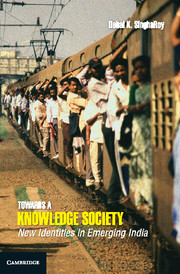Book contents
- Frontmatter
- Contents
- List of Tables and Figures
- Preface
- 1 Introduction: Conceptualising Knowledge Society: Critical Dimensions and Ideal Image
- 2 Critiquing and Contextualising Knowledge Society
- 3 Strategising for Knowledge Society in India: The Shifting Backdrops and Emerging Contexts
- 4 Education for Knowledge Society in India
- 5 Information and Communication Technologies for Knowledge Society
- 6 Indian Growth Story: Service and Knowledge Dynamics
- 7 Education, ICTs and Work: The Divergent Empirical Reality
- 8 Knowledge Society: Work, Workers and Work Relations
- 9 Knowledge Society: Culture, Continuity and Contradictions
- 10 Conclusion: Marginality, Identity, Fluidity and Beyond
- Bibliography
- Index
1 - Introduction: Conceptualising Knowledge Society: Critical Dimensions and Ideal Image
Published online by Cambridge University Press: 05 August 2014
- Frontmatter
- Contents
- List of Tables and Figures
- Preface
- 1 Introduction: Conceptualising Knowledge Society: Critical Dimensions and Ideal Image
- 2 Critiquing and Contextualising Knowledge Society
- 3 Strategising for Knowledge Society in India: The Shifting Backdrops and Emerging Contexts
- 4 Education for Knowledge Society in India
- 5 Information and Communication Technologies for Knowledge Society
- 6 Indian Growth Story: Service and Knowledge Dynamics
- 7 Education, ICTs and Work: The Divergent Empirical Reality
- 8 Knowledge Society: Work, Workers and Work Relations
- 9 Knowledge Society: Culture, Continuity and Contradictions
- 10 Conclusion: Marginality, Identity, Fluidity and Beyond
- Bibliography
- Index
Summary
Knowledge Society and Its Emergence
Human societies have borne witness to the continuous process of progression from an early stage of hunting-gathering to agrarian, agrarian to industrial and industrial to postindustrial and to contemporary knowledge society. These progressions have been shaped by a variety of factors including those of perceived inability and weakness of given arrangements to cope with the need of existing societies, on the one hand, and new technological discoveries, advancements of thoughts, ideals and values, on the other. These are again accompanied by the resurgence of new actions of the state, market, civil society and people; and articulation of diverse interests and identities and formation of new collectivities in society. Significantly, in the core of such discoveries and advancements, resurgence and articulation and day-to-day functioning of society lies the flame of new knowledge as the key livewire to shape social progression locating itself in the centre of all social dynamics, becoming the pivotal foundation for all transformative thoughts and social actions. This new body of knowledge integrates innovative meaning and world view to these progressions mediating itself with the interplay of conceptual abstraction and empirical realities in society; and fosters new technological, economic and social arrangements therein.
In every stage of its progression, human society has used and developed knowledge and attached emphasis on specific type(s) of knowledge in view of its own need and context. However, the intensity of such use and development of knowledge has been historically eclectic, and remained socially and technologically circumscribed.
- Type
- Chapter
- Information
- Towards a Knowledge SocietyNew Identities in Emerging India, pp. 1 - 36Publisher: Cambridge University PressPrint publication year: 2014



